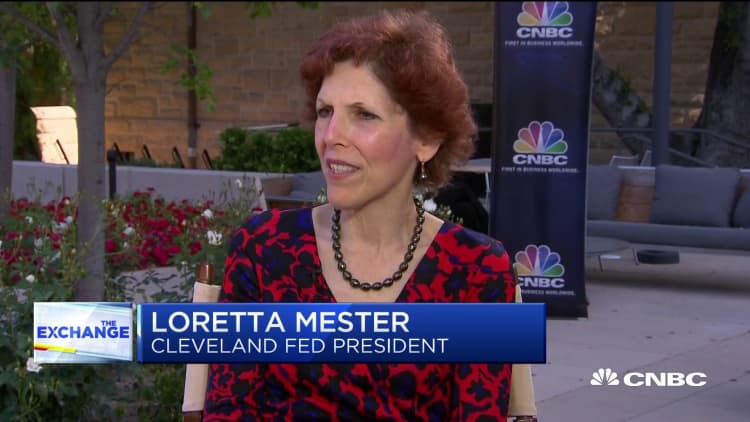
Cleveland Federal Reserve President Loretta Mester said Friday that she sees no need to adjust the central bank's current monetary policy and supports the current wait-and-see approach.
Speaking from Stanford, California, Mester told CNBC's Steve Liesman that between robust job gains and stronger GDP growth, the Fed's best course is to continue to act in response to forthcoming economic data.
"I fully support our patient approach to looking at what the data's telling us as it comes in," Mester said from Stanford, California. "Our interest rate policy, I think, is exactly appropriate for now and we'll just see how the economy evolves."
"The job market is strong and today's report just reinforces that we have a strong labor market, which is great," she added. "We have inflation a little bit below our target, but stable prices. We have productivity growth growing, which is a good positive for the economy."
Mester's comments come after the Fed said in January it will be "patient" about future adjustments to monetary policy after hiking rates four times in 2018. President Donald Trump, however, has blamed Fed officials and higher borrowing costs for curbing economic growth, saying earlier this week that he'd prefer a full percentage point cut to the overnight lending rate.
Still, first-quarter gross domestic product expanded by 3.2%, ahead of what economists had expected, the first time since 2015 that first-quarter GDP topped 3%. It's those positive economic indicators — including Friday's stronger-than-expected April jobs report — that help offset concerns of weaker inflation, Mester said, and justifies patience in current monetary policy debate.
"I do think that we have to take seriously our 2% inflation goal and work to try to get inflation back to our goal over time. But I also agree that we need to be patient about it and we need to look at the data and underlying data to understand what's going on," she said.
"I would be concerned if inflation expectations were falling, if aggregate demand was falling, if the signal of low inflation was that growth was going down, but there's no evidence of that," Mester said.


